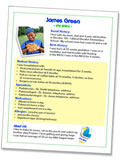Information for Families
As they grow, children are always learning new things. CDC has developed tools and information to help you keep track of your child’s development and get help if you’re concerned.
If You’re Concerned – Act Early!
If you’re worried that your child is not reaching milestones at the same time as other children the same age, visit our web page to find out what you can do to help.
Nominate Your Champion for Families
Read Amazing Me -- It’s Busy Being 3!
In Amazing Me -- It’s Busy Being 3! Joey, a 3-year-old kangaroo, shows what he can do in one AMAZING day. This children’s book teaches parents developmental milestones as they read to their young child.
Create My Child's Story
 Create a resume of sorts, a printed form you can leave with the doctor that explains who your child is within the family and outlines his or her medical history. This can also be a great tool for you, putting all your child’s medical information in one place.
Create a resume of sorts, a printed form you can leave with the doctor that explains who your child is within the family and outlines his or her medical history. This can also be a great tool for you, putting all your child’s medical information in one place.
Tools and Resources
 Milestones
Milestones
See milestones that children should reach from 3 months to 5 years of age, plus interactive tools to help keep track of the milestones.
Parent Resource Kit
The free Parent Resource Kit contains information on developmental milestones by age (3 months to 5 years), developmental screening, and a growth chart.
Positive Parenting Tips
Find tips for positive parenting and child safety according to the age groups below.
Infants 0-1 years old
Toddlers 1-2 years old
Toddlers 2-3 years old
Preschoolers 3-5 years old
Middle Childhood 6-8 years old
Middle Childhood 9-11 years old
Early Adolescence 12-14 years old
Middle Adolescence 15-17 years old
Developmental Screening
Information on developmental screening especially for families.
The American Academy of Pediatrics recommends that children be screened for general development using standardized, validated tools at 9, 18, and 24 or 30 months and for autism at 18 and 24 months or whenever a parent or provider has a concern. Ask your child’s doctor about your child’s developmental screening.
“Learn the signs. Act early.” materials are not a substitute for standardized, validated developmental screening tools.
For information on preparing, responding to, and recovering from natural disasters, visit the National Child Traumatic Stress Network.
Links to Other Websites
Easter Seals
Easter Seals, through support from the CVS Caremark Charitable Trust, provides parents with FREE access to the Ages & Stages Questionnaires®, Third Edition, one of many general developmental screening tools. Click here to learn more and take the questionnaire. Be sure to share the completed questionnaire and results with your child’s doctor.
CYFERnet
CYFERnet's Website brings together the best children, youth, and family resources of all the public land-grant universities in the country. Materials are carefully reviewed by college and university faculty.
Just in Time Parenting (JITP)
Quality, research-based information to families at the time it can be most useful.
National Dissemination Center for Children with Disabilities (NICHCY)
Find information to help support you in caring for your child with a disability, or helping children with disabilities achieve their full potential.
Parent to Parent-USA
Parent to Parent programs provide emotional and informational support to families of children who have special needs most notably by matching parents seeking support with an experienced, trained 'Support Parent'.

State Health Insurance Program (SCHIP)
Your children may be eligible for free or low-cost health insurance. Every state in the nation has a health insurance program for infants, children and teens. The insurance is available to children in working families.
» Phone: 1-877-KIDS-NOW
Zero to Three
Science-based information and tools designed to help parents and caregivers nurture their young children’s development.

Contact Us:
- Centers for Disease Control and Prevention
National Center on Birth Defects and Developmental Disabilities
Division of Birth Defects and Developmental Disabilities
1600 Clifton Road
MS E-87
Atlanta, GA 30333 - 800-CDC-INFO
(800-232-4636)
TTY: (888) 232-6348
New Hours of Operation
8am-8pm ET/Monday-Friday
Closed Holidays - cdcinfo@cdc.gov





